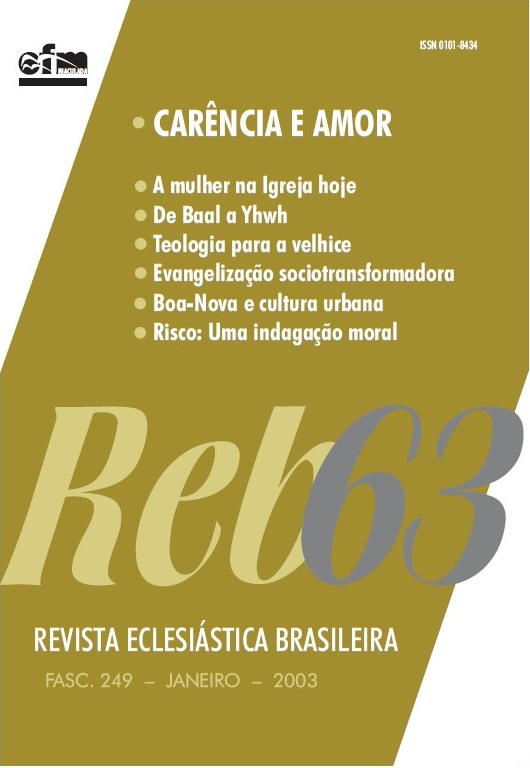De Baal a Yhwh. Ensaio sobre a Religião de Israel
DOI:
https://doi.org/10.29386/reb.v63i249.1829Keywords:
Religião, Israel.Abstract
O artigo tem como objetivo elucidar as características da prática religiosa do povo de Israel até o exílio, enfocando sobretudo a relação religiosa com Yhwh. A conclusão é que no início da história do povo de Israel a sua fé não era monoteísta e o Deus de Moisés era um entre outros deuses. O primeiro monoteísmo aparece na pregação profética e nas reformas de Ezequias. Josias, porém, foi quem deu o passo fundamental, implantando, todavia, um sistema religioso que era apenas oficial, mas não necessariamente abraçado por todos. A partir do Exílio em Babilônia, Israel acolhe definitivamente o monoteísmo e nasce o judaísmo. Essas conclusões são alcançadas com base na análise de passagens bíblicas, de resultados obtidos pela arqueologia e de textos que formam o conjunto literário do antigo Oriente Próximo.
Abstract: The objective of this article is to clarify the characteristics of the Israeli people’s religious practice up to the Exile, focusing in particular on the religious relation with Yhwh. Our conclusion is that, in the early stages of the Israeli people’s history, their faith was not monotheist and Moses’ God was but one among other gods. The first signs of monotheism appear in Ezekiel’s prophetic preaching and in his reforms. Josiah, however, gave the essential step for the implantation of a religious system that, albeit official, was not necessarily embraced by all. After the Exile in Babylon, Israel finally accepted monotheism and thus Judaism was born. We reached these conclusions through an analysis of biblical passages, of archeological findings and of the texts that make up the literary body of the ancient Near East.
Downloads
Downloads
Published
How to Cite
Issue
Section
License
Copyright (c) 2019 Revista Eclesiástica Brasileira

This work is licensed under a Creative Commons Attribution 4.0 International License.
Os autores cedem os direitos autorais; como gratificação, a REB oferece dois exemplares ao Autor de um artigo.
A REB adere à licença não comercial (Creative Commons). Portanto, é permitida cópia, distribuição e exibição dos textos, respeitados os direitos autorais e citada a fonte de sua proveniência.


